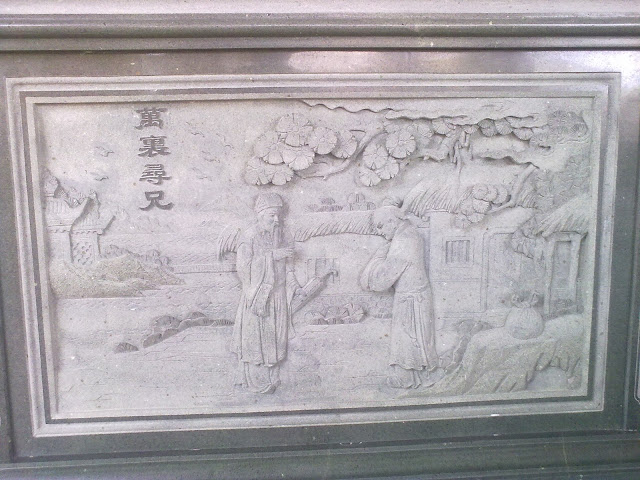馬「先生」的競選廣告,公告了「珍惜」「國家」的「正確」方法。問題是,馬「先生」所謂的「國家」是哪一個?是臺灣國、中華民國,還是中華人民共和國?
「珍惜國家,是用做的,不是用說的」
馬「先生」的競選影片-愛國旗篇說:「珍惜國家,是用做的,不是用說的」那麼馬「先生」自己是如何「珍惜」「國家」的呢?2001年,亞女足賽,馬「先生」領導的警察阻止民衆帶車輪旗;陳雲林來臺時,警察更毀車輪旗、護五星旗。這麼說,在馬「先生」領導下,公務員的作爲,車輪旗迴避五星旗,是「珍惜國家」的「正確」方法了?如果馬「先生」所「珍惜」的是中華民國,那麼毀車輪旗是「珍惜」的正確方法了?還是說馬「先生」所「珍惜」的其實是「中華人民共和國」?
馬英九禁止民眾帶國旗
警毀車輪旗 反護五星旗-完整版
馬「先生」還說:「感謝『所有』曾經『用力』揮動國旗的人」。既然說是「所有」,那麼就包括了那些「用力揮舞國旗」打人的人。但是馬「先生」又說:「比起民進黨,你們才是真正守護中華民國尊嚴的人」。所以根據馬「先生」的定義,民進黨就算在世運時在全世界眼前「揮舞國旗」,也不算是「真正守護中華民國的尊嚴的人」,反而那些在「島內」「用力揮舞國旗」打人的人才是。還是說,馬「先生」這裏所謂的「國家」其實不是「中華民國」,而毀車輪、護五星,其實是讓「中華民國」走得有「尊嚴」的方式,而「民進黨」所「做」的,是讓中華民國不得「安息」,走得沒有「尊嚴」?
「感謝所有曾經『用力』揮動國旗的人」:
「比起民進黨,你們才是真正守護中華民國尊嚴的人」
可見民進黨這麼做是「錯」的。
可是筆者納悶了:這年頭幹麼還拿車輪旗啊?就算是那些號稱「一中各表」的,也只敢在「島內」「自表」,騙騙魈爺,這地球上,除了中華人民共和國南京總統府博物館的管理員以外,誰還拿車輪旗當一回事啊?
以卿雲歌爲國歌、五色旗爲國旗中華民國成立於1912年。要到1921年6月30日才有號稱車輪旗是「國旗」的人去篡正港中華民國的位。國共內戰,蔣介石下野後,如果可以拿著車輪旗來臺號稱「政府播遷」,那麼阿扁現在也可以拿車輪旗越獄,再把中華民國政府「播遷」到南極洲大陸了。對臺灣人來說,車輪旗跟骷髏頭海盜旗一般,不過是逃竄到臺灣喧賓奪主的流寇的山寨旗號。車輪旗對臺灣的糟蹋遠勝狗皮膏藥。現在你們自己要丟了,我們幹麼要撿?號稱要「化獨漸統」的車輪旗手,只要不選舉就「不舉」;夢想著要正名、制憲、獨立、建國的,反而去狗拿耗子。這種似乎荒謬的現象,其實有很簡單的解釋:
「統」派其實是投降、被併吞派。但是他們卻沒有LP大聲喊出真心話,因爲現在全世界都已經見識了中國的落後、野蠻、鴨霸。於是投降、賣國這碼子事就沒了票房:可以「做」,但是千萬不可以「說」。他們對「中華民國」的「珍惜」在於「看守」:不讓臺灣獨立、建國,現在連「島內」的中國人都已經跟全世界接軌:都知道中華民國的土地、政府、人民、主權都已經被中華人民共和國繼承;中華民國的一切圖騰,包括國旗、國歌等等,都將被中華人民共和國的符號取代。但是只要臺灣還戴著「中華民國」這個金箍,那麼當國民黨向共產黨投降時,中華人民共和國就可以念起「繼承」的緊箍咒來接受「中華民國的臺灣」了。
獨派想做的,雖然符合臺灣大多數人民內心深處的期待,但號稱「中間選民」的笨蛋們被國、共兩黨聯手恐嚇、洗腦成了以爲怕死就不會死的現狀豬。所以拒絕被併吞的事,如「統一」一般,也是可以「做」,但是不可以「說」。對「中華民國」的「珍惜」,則在於安撫那些沒有LP正名、制憲的脆弱心靈,用「維持現狀」代替「獨立」,以便「拒絕併吞」。
「統」派爲了要「統」,而以「維持現狀」爲過渡階段;獨派爲了要獨,也以「維持現狀」爲過渡階段。而這相同的「過渡階段」,就是所謂的中華民國。「統」、獨二派爲了討好「中間選民」而各懷鬼胎所以都言不由衷,於是「中華民國」這塊早就沒人真的想要的爛抗棒就此陰錯陽差地同時被兩派撿起來當面具戴,自欺欺人地隱藏真面目。了尾子在半路認的老爸面前都會把面具摘下來踩在腳下,可是王子卻偏在這時候戴上面具來亂,了尾子爲了表忠,不打王子打誰?
「英明」的馬「先生」這次終於說了人話:「珍惜國家,是用做的,不是用說的」問題是:「國家」是哪個國家?是中華人民共和國、中華民國、還是臺灣國?根據民進黨,他們所謂的國家是「現在的名稱叫中華民國」的臺灣;而根據馬「先生」所「做」的,似乎馬先生的「國家」是「中華人民共和國」?您是哪一國的?您想當哪一國人?如果兩派都沒真的把「中華民國」當一回事,您必須二選一,那請問您願意當臺灣國還是中華人民共和國的國民?
Tu cosa fai stasera translation- Just Show Me How To Love You - Sarah Brightman & José Cura
Sarah:
Tu cosa fai stasera?
Rimani ancora un pò
sarà quest' atmosfera
ma non mi dire di no
What are you doing this evening ?
Stay here a little longer
This atmosphere must be it
But don't say "no" to me!
Per farti prigioniero
qualcosa inventerò
ma che bisogno c'era
di amarti subito un pò
To hold you my prisoner
I will invent something
But what is the need
To suddenly love you a bit ?
José:
Questo giorno è una pazzia
ma la luna è amica mia
se ti resta un sogno da buttare via
soli in mezzo a una città
Solo amici e poi chissà
What a crazy day today is
But the moon is my friend
If you still have a dream left to throw away
Us alone in the middle of a city
Just friends and then who knows?
Poi non basta mai
tante cose da dirsi
E baciarsi e capirsi e stringersi
poi non basta mai
si fa tardi ma dai
dove corri a quest'ora?
But in the end it is never enough
With so many things to confess
And kissing and understanding and holding tight
But in the end it is never enough
And it's late but so what?
Where are you rushing to at such an hour like this?
Both:
Just show me how to love you
Io non ti lascio più
gabbiano di scogliera,
io sto, una favola, e tu?
Just show me how to love you
Just show me how to love you
I won't ever leave you again
A seagull of the rocks,
I am, a fairy tale, and you?
Just show me how to love you :)
Sarah:
Fame o febbre o quel che sia
mi ci sento a casa mia
dentro questo sogno da buttare via
non mi sembra vero ma
sembra un'altra la città
Fame or fever or whatever
I feel like home
Within this dream just good to throw away
This doesn't seem true to me but
Seems like another city
José:
E non basta mai
tante cose da dirsi
E baciarsi e capirsi e stringersi
E non basta mai
è già tardi ma dai
dove torni a quest'ora?
And it's never enough
With so much to tell
And kissing and understanding and holding tight
And it's never enough
And it's already late but
Where are you turning to at this hour?
Both:
Just show me how to love you
E ci ridiamo su
gabbiano di scogliera
ma dov'êri nascosto'
dov'êri finora?
Just show me how to love you
And at it we will laugh
Seagull of the rocks
But where have you been hiding
Hiding until now?
Sarah:
Tu cosa fai stasera?
Ci ridiamo su
magari un'altra sera
ed è già domattina
e la luna la spegni tu!
What are you doing this evening ?
We'll laugh at it
Perhaps another evening
And it's already morning*
And the moon, you switch it off! **
*Literally tomorrow morning
** Emphasise that: It's the other's duty to switch off the moon -- the light because now it's tomorrow morning but it's still quite early ;)
Free counters

















